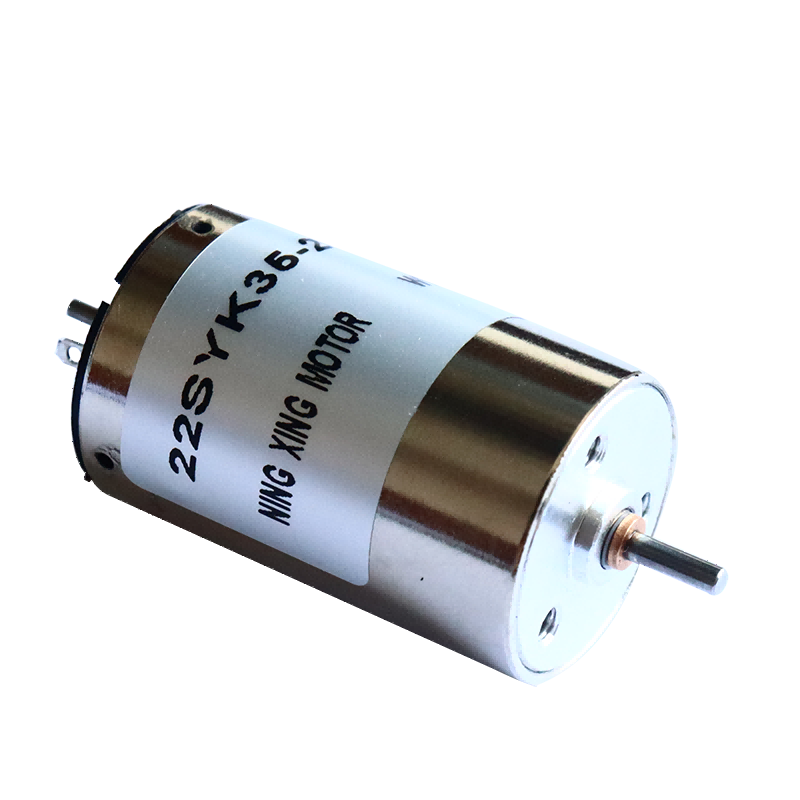The Power Behind Precision: Why Precious Metal Brush Motors Are a Game-Changer
2025-03-13
When it comes to motors that require precise and reliable operation, few can match the performance of precious metal brush motors. Whether it’s for high-end electronics, medical equipment, or other critical applications, these motors have a proven track record of delivering exceptional performance. In this blog, we will dive deep into what precious metal brush motors are, how they work, and why they are indispensable in various industries.
What Are Precious Metal Brush Motors?
Precious metal brush motors are a type of brushed DC motor that uses high-quality materials, specifically precious metals, for the brush and commutator components. Unlike traditional brush motors that may use carbon or copper brushes, these motors use materials like silver, gold, or platinum for better conductivity, reduced wear, and improved efficiency.
These motors are designed for applications that demand precision, durability, and a high level of performance. The use of precious metals for the brushes improves the motor's longevity and functionality in environments where regular motors might not be able to perform as effectively.
How Do Precious Metal Brush Motors Work?
At their core, precious metal brush motors work similarly to traditional DC motors. Here’s how they operate:
1. Electric Current: The motor is powered by an electrical current, which flows through the brushes to the commutator. The commutator is a rotating component that connects to the rotor, and it helps to switch the direction of the current, ensuring the motor keeps turning.
2. Brush and Commutator Interaction: In a typical motor, the brushes make contact with the commutator to transfer electricity. However, the brushes made from precious metals, such as silver or gold, offer superior electrical conductivity compared to conventional materials. This means less resistance, lower heat buildup, and greater efficiency.
3. Rotation: As the current flows through the brushes and commutator, a magnetic field is created around the rotor. This causes the rotor to rotate, which drives the motor’s output shaft. The rotation continues as long as electrical current flows, making the motor useful for a wide variety of tasks.
Benefits of Precious Metal Brush Motors
Precious metal brush motors come with several benefits, making them ideal for specialized applications. These include:
1. Enhanced Durability: Precious metals are highly resistant to wear and tear. The brushes made from silver, gold, or platinum are less likely to degrade over time compared to traditional materials. This extends the life of the motor and makes it suitable for long-term, continuous use in demanding environments.
2. Superior Conductivity: Precious metals like silver and gold have excellent electrical conductivity, which means less energy is wasted as heat. This improves the motor's efficiency, leading to better performance, especially in applications where energy consumption is a concern.
3. Low Maintenance: Since the brushes in these motors wear down more slowly and are less prone to corrosion, maintenance requirements are significantly reduced. This makes them ideal for industries where uptime is critical, and equipment cannot afford to be out of service for maintenance.
4. Precise and Reliable Performance: The high-quality materials used in precious metal brush motors allow for smoother operation, fewer fluctuations in speed, and more consistent performance. This makes them perfect for sensitive applications where precision and reliability are paramount.
5. Resilience in Harsh Environments: Precious metal brush motors are highly resistant to corrosion, oxidation, and other environmental factors. This makes them a great choice for industries that require motors to operate in extreme conditions, such as aerospace, medical devices, or marine environments.
6. Compact and Efficient Design: The improved conductivity and reduced heat generation lead to a more compact and efficient motor design. This is particularly important in applications where space is limited, and energy efficiency is a priority.
Applications of Precious Metal Brush Motors
Given their reliability and performance, precious metal brush motors are used in a variety of critical industries and applications:
1. Medical Devices: In medical equipment, precision is a must. Precious metal brush motors are used in devices such as surgical tools, infusion pumps, and respirators, where accuracy and reliability are vital.
2. Aerospace: The aerospace industry demands motors that can operate under extreme conditions while maintaining high performance. Precious metal brush motors are used in actuators, flight control systems, and satellite components, where reliability and precision are crucial.
3. Robotics: Robotics, particularly those used in delicate tasks like surgery or precision manufacturing, relies on precise and efficient motors. Precious metal brush motors provide the fine control necessary for these applications.
4. Consumer Electronics: Many high-end electronics, such as high-performance motors in cameras, printers, and medical diagnostic equipment, rely on precious metal brush motors for smooth and reliable operation.
5. Automotive: Precious metal brush motors are found in high-end automotive applications like electric vehicle motors or precision steering systems, where low maintenance and high efficiency are essential.
6. Industrial Machinery: For industrial machinery that requires precision in operation, such as robots in assembly lines or high-precision manufacturing tools, precious metal brush motors provide the necessary power and reliability.
Drawbacks and Limitations
While precious metal brush motors offer numerous advantages, there are some drawbacks to consider:
1. Cost: Precious metals, such as gold and silver, are expensive. As a result, motors made with these materials tend to have a higher upfront cost. This makes them less ideal for low-cost, high-volume applications.
2. Size and Weight: Precious metal brush motors tend to be bulkier and heavier than some other types of motors. While they are still compact compared to other industrial motors, their weight may be a limiting factor in certain applications where lightweight components are essential.
3. Complexity: The use of precious metals can complicate the manufacturing process, which may increase production times and costs. Additionally, these motors may require specialized equipment and knowledge to maintain and repair.
Conclusion
Precious metal brush motors are an excellent choice for applications that require precision, reliability, and long-lasting performance. Their ability to offer superior conductivity, reduced wear, and enhanced durability makes them indispensable in industries such as medical, aerospace, robotics, and electronics. While their higher cost and weight may be limiting factors in some cases, the benefits they offer in terms of efficiency and longevity make them a worthwhile investment for applications where performance cannot be compromised.
In a world where precision and reliability are paramount, precious metal brush motors continue to play a critical role in powering the technologies of tomorrow. Their performance is nothing short of impressive, and their future looks brighter than ever as the demand for efficient and durable motors grows across various industries.



